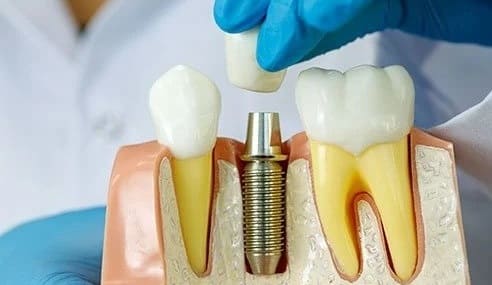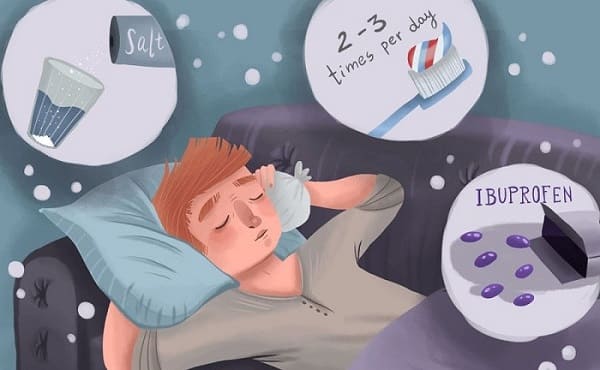If you’ve recently had a dental implant placed, you may be wondering when you can expect your pain and discomfort to subside after surgery. Some minor pain and discomfort are normal after treatment. dentists uses the latest technology and surgical techniques to ensure the procedure is minimally-invasive and pain-free. However, the process of placing a dental implant still involves major oral surgery to create an opening in the gums and jaw where your implant can be placed.
It’s totally normal to feel some pain and discomfort after surgery when the numbing agents and sedation wear off. However, you will likely notice some pain, discomfort, swelling, bruising and inflammation by the end of the day. Follow the instructions given to you by your dentist to ensure that you modify your diet and activities properly, and give your mouth enough time to heal.
Why Choose Dental Implants?
A dental implant functions just like your natural tooth root, anchoring the crown and stimulating the jawbone each time you bite and chew food. With dental implants, you can brush, eat, and floss just like normal, and with proper care and oral hygiene, they can last a lifetime.
In addition to this benefit, dental implants also provide enough biting pressure to maintain bone density in the jaw. Tooth loss leads to deterioration in the jawbone, as the bone isn’t being stimulated by chewing and biting.
Over time, just one missing tooth can cause structural changes in the jaw, causing other teeth to shift. Dental implants are an alternative to dentures that can slip and have to be replaced every 5-7 years. They also don’t provide the necessary bite pressure to maintain jawbone density.
Planning and Consultation
Your first step to getting a dental implant is to meet with your dentist for a consultation and examination. Your dentist takes X-rays of your teeth and jaw and determines if additional teeth must be extracted first. If you’ve lost bone density in your jaw, you may need a bone graft before you can receive your dental implant.
Dental Implant Procedure
To insert the small titanium dental implant, your dentist safely drills a tiny hole in your jawbone. The implant mimics the root of your original tooth. If you are replacing multiple teeth, your dentist installs several implants that serve as a bridge for the new teeth.
This is a surgical operation, and your dentist typically gives you a local anesthetic to numb the affected areas. Although they are making a small incision in your gum, there is unlikely to be dental implant pain, as the anesthetic helps to alleviate discomfort. At No Gaps Dental, several of our locations also offer inhalation sedation dentistry using laughing gas to ease any anxiety you may have.
There should not be any dental implant pain in your jaw because there are actually very few nerve endings in this area. You should only feel the vibration and pressure of the dentist’s tools during the procedure.
After your dentist has inserted the implant, they ask you to close your teeth over a piece of gauze gently. This helps the implant take hold and stems bleeding from the gums. You can expect the recovery phase to last for 7-10 days. Your gums will be very sensitive immediately after the operation, but there are steps you can take to minimize dental implant pain.
How Long Do Dental Implants Hurt?
It is common for patients to experience some pain after the dental implant procedure. Initially, the discomfort may last one to two days. However, some patients may continue to experience pain at the implant site for up to 10 days.
Initial Pain After Your Dental Implant Surgery (1-3 Days)
The process of implant surgery is very advanced and minimally-invasive, and the goal is always to reduce post-operative pain. However, the fact remains that it is a major oral surgery, which requires dentist to create an opening in your gum and jaw tissue.
Because of this, some discomfort is to be expected after your surgery. Within a few hours, your numbing and sedation will wear off, and you may experience pain, discomfort, and tenderness near the affected tooth. During the first few days after your procedure, you will likely also experience swelling, bruising and inflammation near the implant site. Intermittent bleeding is also common.
This is all normal, and not a cause for concern. Make sure to follow the recovery instructions provided to you by dentist to ensure that you take proper care of your implant and speed up your recovery.
Healing & Recovering (3-7 Days)
By about 3-5 days, the discomfort and side effects of your implant should peak and then begin to subside. Within a week, most patients experience much less tenderness, and bruising and swelling will begin to subside as the area around the implant heals. After one week post-op, most patients can begin eating their normal diet again, though this may vary.
Full Recovery (7-14 Days)
Depending on the individual, full recovery usually occurs within 1-2 weeks post-op (though another 3-6 months is necessary to ensure that your implant fully bonds with your jaw bone). When your implant is fully healed, you should feel no pain or discomfort, though it still may be slightly tender when pressure is placed on it. At this point, you can resume your normal diet, and strenuous activities like weight lifting and running.
How to Minimize Tooth Implant Pain?
In the first 24 hours, any tooth implant pain is likely caused by mild swelling of the gums. This is when the gums are at their most sensitive, and there may be inflammation, which makes it difficult to talk or eat.
You have been through a surgical operation; therefore, it is essential to get plenty of rest and to stay hydrated. Gently brush your natural teeth or temporary crowns, taking care not to put undue pressure on your new dental implant.
Maintaining good oral hygiene can help to minimize the chances of an infection, which is an avoidable cause of tooth implant pain. Should you suspect you have signs of an infection, inform your dentist immediately. They will inspect the area and prescribe an antibiotic if one is required.
For at least one week after surgery, use a warm salt water rinse to clean around the inside of your mouth. This will also help to avoid infection and cleanse your mouth of bacteria build-up.
To reduce swelling in the gums, use an ice pack. Gently press it to the side of your mouth and allow it to soothe any discomfort. You can also take over-the-counter pain relievers to ease any discomfort you may feel.
Eat Sensibly
After your dental implant surgery, you must adapt your diet to help your new implants take hold and to avoid causing unnecessary discomfort.
Eat soft foods such as beans, rice, and fruit, such as bananas. Drink beverages that are low in sugar and are not hot. Your gums are particularly sensitive after your procedure, so treat them gently. Avoid tougher foods such as steak, apples, and carrots while you recover. Trying to chew food that is difficult to break down may cause complications with your new implants and lead to discomfort.
What If I Feel Pain After 2 Weeks And It Doesn’t Go Away?
This is not normal. Something may be interfering with proper healing. Smoking tobacco immediately after implant placement, for example, can dramatically slow down the healing process.
It’s also possible that your implant has been infected, or that your body is reacting to the presence of the metal and is rejecting the implant. Whatever the cause, you should definitely see a qualified dentist for a follow-up if you are still experiencing serious pain and discomfort 2+ weeks after your operation. This is not normal.
Gum Disease and Dental Implant Pain
Dental implants aren’t like normal teeth because they don’t have nerves inside the tooth. The implant itself is completely incapable of experiencing pain. Pain associated with a dental implant must be coming from somewhere else.
Most often, the dental implant pain is coming from the gums and bone around the dental implant. A dental implant infection, peri-implantitis, is the most common cause of pain around a dental implant. This is when bacteria have begun to invade the bone around the dental implant. It is similar to gum disease. Sometimes this is related to problems with the dental implant procedure, such as excess cement from the abutment. This might be related to poor oral hygiene. But many times there’s no traceable cause this type of infection.
This can be treated with antibiotics as well as removal of any contaminated material.
Biting Bad
If the dental implant doesn’t fit in properly with your bite, it can also cause pain in the bone around your dental implant. When you bite down, excess force on your dental implant causes it to push down into the bone, which causes discomfort. This discomfort occurs during or after chewing.
If this is what’s making your dental implant hurt, can be treated by changing the dental crown atop the implant. Replacing it with one that fits better into your bite will resolve your discomfort.
Neighboring Teeth
Other times, a dental implant can be uncomfortable because it hasn’t been placed properly, and it’s interfering with neighboring teeth. When properly placed, dental implants help your other teeth, but in this situation, it may have damaged its neighbor. This may mean that tooth has to be removed. Experienced implant dentists know how to avoid this type of problem, so it’s rare.
Will My Tooth Implant Need to Be Replaced?
Not necessarily. When teeth implants hurt, it’s related to a potentially serious cause that could lead to implant failure. However, with proper treatment, many causes of pain can be relieved without removing the implant. Dental implants can last a lifetime if properly cared for. Pain doesn’t necessarily change that. The quicker you act on implant pain, the more likely we can save the implant and preserve it.
If your tooth implant does need to be removed, dentists will talk to you about options to replace it. Sometimes, you can get a new implant placed right away. Other times, dentists might need to treat the site and prepare it for a future implant. Dental implant pain is rare, especially if you choose your implant dentist with care.






